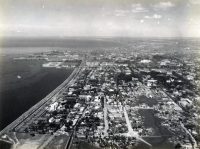’Twas the night before Christmas and all through the house . . . No, that’s not night, I’m mixed up. All through the house everybody’s stirring, even the mice!
What a night! I have to write this down, frantic though it may sound, so that I can always remember it exactly as it happened.
I was crouched over the radio, listening to Voice of Freedom. The ceiling had been blown out by concussion from the tremendous explosions. We could hear Japanese vehicles roaring around the neighborhood, blackout had us in the gloom of a couple of lanterns, there had been no bombing that evening, but we could hear distant guns. The telephone rang. It was Alex, the Greek, and I hope he isn’t the prevaricator that that other well-known Greek, Ananias was. He told us in our double talk—or told Janson—we needn’t buy any more beans, meaning the end was here. The radio was saying the troops had passed Calumpit, so I couldn’t believe
they were already in. Later Alex phoned to say the First Cavalry, he thought, had taken Santo Tomas, and that our flag was flying over Malacanan Palace and San Miguel brewery.
We have no way of verifying it—it seems too good to be true. The lights and water are still on, and the phone. Santo Tomas is many kilometers from our suburb. There is tremendous activity in the streets, explosions, motor vehicles roaring. At each explosion we jump to see if we still have lights and water, for when they blow the bridges the water will cease, as the conduits are beneath the bridge structure.
The poor children are just as excited as we are, we can’t keep them in bed. It’s past midnight and I took time out to write this while another pot of coffee is brewing.
Later in the night. I can’t hear anything that fits my idea of troops entering the city. The Japs are roaring out of the motor pool a block from us—a pool which this morning sheltered half a dozen trucks and several good-looking cars, concealed beneath banana-leaf camouflage. There’s a terrific amount of shouting, but there can’t be so many troops left in Pasay; they have been moving out along the south roads for days. Something is being blown up on the other side of the river; we can see the flashes and try to judge the distance by my stop watch. I can’t judge an explosion by the noise it makes. It may be the Escolta buildings, or the bridges. There was a terrible explosion this morning near the market, and I expected the whole village to be gone, but it turned out to be only a smallish hole in the middle of the street and a dead Jap hanging on the wires, only one! Probably another case of “didn’t know it was loaded.”
Janson thinks they are all rushing to the airfield, a few blocks from us. But if the troops are coming in on the other side of the river? I’m no military strategist, he sarcastically reminds me. There may be other troops coming in, our way!
It’s strange how individualistic each of us is. The greatest military operation in the history of the world is now taking place in Europe. I just listened to details of that stupendous Russian push toward Berlin, but I can’t think about that; for our show, our town, the end of our slavery, the liberation of the prisoners, of the internees—these are our own problems, and Europe seems another world.
If this be liberation, so far it’s painless for us. We’ve lived in a welter of filled-up bathtubs, demijohns of boiled water, sat practically wreathed in cans of corned beef, money, papers, letters, expecting to have to make a run for it at any moment. We’re all prepared for fire, murder, looting, water shortage, and starvation. But now, at two in the morning, it looks as though nothing startling is going to happen at “Janson’s Last Stand,” as I call our little street so filled with tank traps and barricaded at both ends. I’ve even got a gun, it’s a .45 that’s been buried so many times I’m sure it won’t work, but it looks frightening! Janson’s works, I hope.
